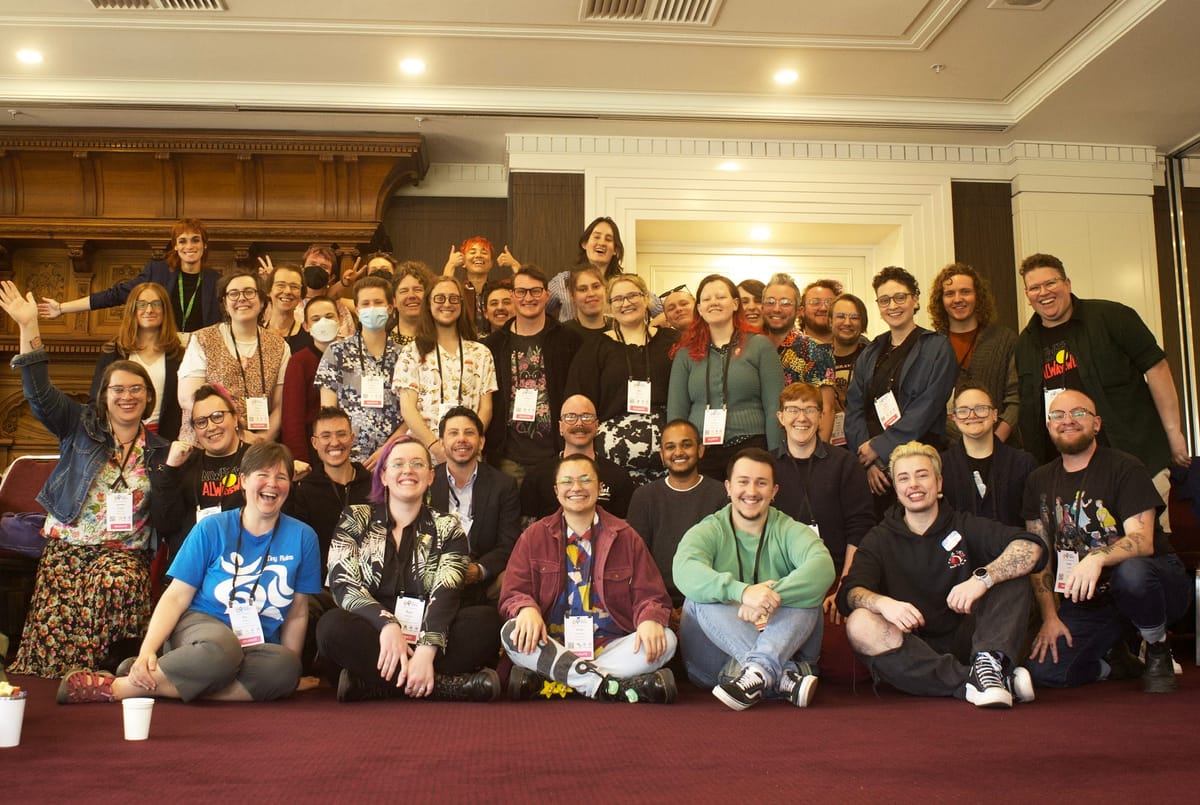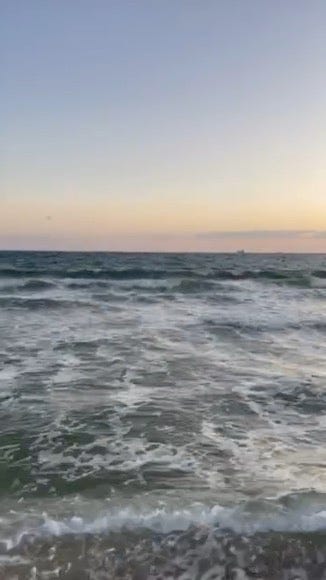Solutide & Community in Narrm
This piece of writing feels just as massive as the weekend it grew out of. I was lucky enough to travel to Narrm for the 2023 combined AusPATH & PATHA conference.

Elements of this post were written in Narrm, on Wurundjeri land which has never been ceded. Thank you to the people of the Kulin Nation for hosting us so generously. I’d like to pay my respects to their elders, past, present, and emerging.
This piece of writing feels just as massive as the weekend it grew out of. I was lucky enough to travel to Narrm for the 2023 combined AusPATH & PATHA conference - a regular gathering of those working in and across trans health, with and for and by trans people.
I was there wearing many hats - as director of Qtopia, presenting about the work we’ve done in Waitaha Canterbury over the last five years to improve access to gender affirming care and mental health support. As the PATHA VP, in a formal capacity opening the conference and chairing sessions. But also as myself, as a trans person working in trans health across many different roles - peer work, education, leadership.
In some ways, that was the most valuable element. The opportunity to connect with so many other trans people, so many other people in similar positions, utilising their own lived experiences. The reminder that we don’t work this alone, even when, at times, we are the only ones. The complexities of working for your community and the impact that can have on your own relationship with community.
That thing where someone speaks aloud the feeling you didn’t even know you were having:
It can feel lonely being the trans person in charge.
I didn’t think about it too actively, before getting on the plane. I was last in Narrm as a ten year old. I think in my mind, it would be like visiting Tāmaki.
I made poor decisions (😅) - a flight that meant I needed to be at the airport at 3am; choosing not to sleep beforehand; not sleeping enough on the flight; forgetting entirely that when you travel to a different country, your phone probably won’t work unless you’ve set up roaming beforehand.
I arrived in Narrm around 8am Australian time, having not slept for 26 hours, with a phone on 10% and no data. The airport free wifi didn’t work, for anyone. I caught the bus into the city centre and was immediately, totally overwhelmed. The next day, someone would offhandedly say “a city of 5 million” and that’s when it hit me - our whole country lives in this city. It’s no wonder I was overwhelmed.
I walked in circles for two hours after picking up a SIM, trying to find a place where I could both get a coffee and plug my phone in. The city’s grid, so small on google maps, was so much bigger in the physical.
Te Tiriti gives me the privilege of connection to this land, of being tangata tiriti. When I return home from Narrm, when the wheels touch the tarmac, when I exit the terminal and feel the wind on my face, I know I am home.
I love Ōtautahi - I love our city and the people in it. That it’s small doesn’t usually bother me. But after spending a week around so many other people - so many other trans people - I’m feeling the size of it, and I haven’t even returned.
The conference itself was such a good opportunity to be reminded of why we do this work, and to be reminded of how much work we’ve done and how far we’ve come. I felt like I bragged in my presentation, like I spent 20 minutes talking up Ōtautahi without giving a clear way forward for everyone else.
Thankfully, I heard pretty quick how useful it was - and reflecting on how useful everyone else’s mahi for me was, it makes sense now. So many of the presentations shared hope, shared ways people have found to do this work within structural systems that don’t often make it easy.
It was challenging, too. When I caught up with a friend the week before the conference, he let me know that AusPATH might have a different style or perspective or vibe to how PATHA has been running things. It’s not unexpected - so many of the PATHS (professional associations for trans health) worldwide have historically prioritised clinical voices over community. WPATH, the World Professional Association for Trans Health, was established in 1979 and only had its first trans president 28 years later, in 2007.
We’ve still got a problem in talking about sex and gender. Even binary & non-binary is a binary. Talking about BRS or ASAB is still just talking about sex in an essentialist way. How and when will we move past this? Will academics and clinicians be the ones to make this move?
AusPATH, like so many other PATHs, has really changed. This conference was the most trans it’s ever been - this photo, taken on the last day, captures only some of the trans peer workers in attendance:

But still, it was challenging at times. The conversations community are having, some of the conversations we’re having in Aotearoa, are a little different to where clinicians are coming from. At times, we’re talking self-determination and how gender assessments aren’t really necessary, while some are talking about how to make assessments better.
If assessments intended to reduce regret don’t work - why do we do them? What’s the point? It’s colonial capitalism, it’s enshrined power structures, it’s because true self-determination is a threat to structures of power.
Our system is under so much stress. Why are we asking our mental health practitioners, so sorely needed for so many people, to do work that is ineffectual, irrelevant, and getting in the way of someone’s self-determination?
But that’s what makes the PATHs, when done right, work so well. True collaboration, true partnerships between clinicians and community. My friend Teddy said it so well in that last trans peer worker meet - we’ve both seen cisgender clinicians get up in arms, get emotional, get so determined to fight for our rights. The dedication to our community is on another level, like it’s never been before.
What I’ve found so valuable has been meeting other trans peer workers - and especially other trans leaders in similar mahi. Even other trans leaders in similar mahi and similar orgs who are further ahead than we are. I don’t know if our ecosystem isn’t big enough for that. We get burnt out so fast. There are lots of us around the country, but no one who has been doing this mahi for ten years in the ways I was able to connect with in Narrm.
It was a new experience, being on someone else’s land. The last time I travelled internationally, I had barely begun my own processes of decolonisation, of beginning to engage with te Ao Māori. It felt complex, being in such a different context and navigating what was tika for our Aotearoa contingent. Trying to uphold the safety of our whānau who had joined us, sitting in a position of power as a Pākehā person on another colonised, unceded land.
Maybe I’d still feel the same way even if we opened with mihi, closed with waiata, like PATHA did in our room. Maybe it sits strangely, being the one to do closing karakia, tangata Tiriti on country with no treaty.
And then, all of a sudden, it was over. The days were long and fully loaded - sessions were two hours long, and you’d be listening to people present for six hours a day. I was surrounded on all sides by my community for three full days in ways that I haven’t been for a long time, despite working in and for my community for years now.
Maybe it’s time for an Aotearoa peer worker hui.
To be so thoroughly surrounded makes the solitude starker.
I needed to have a cry today.
In the days since, I’ve been reaching, arms outstretched, for those connections. Shared emails. Followed each other on instagram. Read and heard everyone else feeling similar feelings, sitting in that complex space of having our cups so thoroughly filled, and then returning to starkly different contexts.
But I’m also so, so inspired. I’m inspired by trans people working for our communities. By those working in big, big teams, and by those working in isolation, the only trans people in their services, in advisory groups, being that sole visible flame for everyone who comes afterwards.
I sat next to Teddy Cook, who has been in a leadership position in a large organisation for ten years. I listened to his community thank him. I listened to him talk about that solitude, the loneliness that comes with being the visible one, the one people look up to. I listened to him ask for community and I was inspired.
I sat two seats across from Elle Void, who organised these opportunities for connection. Who works tirelessly to ensure no one has to feel like they’re working alone. And I was inspired.
And I connected with trans people working in peer roles in Aotearoa I didn’t even know existed. We’re better for these moments of community vulnerability. We build stronger.
And I am inspired. I’ve come back with a renewed energy, a renewed connection to the kaupapa, to the why. I’m determined to not let this only happen every two years. We’re building a trans-Tasman trans peer work community of practice. We’re building Aotearoa peer work networks. A trans leadership network. So much will come of those three days.
But it took a long time for those feelings of solitude to settle and that invigoration to rise to the surface.
Sunday night, after the conference closing, after many of the Aotearoa contingent sat in a room and introduced ourselves, some of us for the first time. After we sang waiata to send everyone off, I went to the beach.

And I walked. As I had done all weekend, I walked, Purea Nei on a loop in my head. Every time I travel, I drop. It’s getting better the older I get, and it’s definitely got better now that Rochelle and I live together. But there, at St Kilda, my feet in the ocean, I mourned for a moment.
I’ve walked 10km a day in this city of 5 million and have felt connected to these communities. I’m endlessly grateful.
I have so many people to thank here it’s almost overwhelming. Thank you to the community - to everyone who has helped any one of us along the way. To Scout, who quickly became my conference buddy. To Teddy - being able to connect these last few weeks has been revolutionary. To the rest of the PATHA exec - thank you for being such a great team. To AusPATH for hosting us, to the organising committees, to the team on the ground working to make sure everyone is safe and well. So much goes into these events it’s unbelievable.
I’m in te Whanganui-a-Tara this weekend because I’m up for an Impact Award, which is great and overwhelming, not in the least because being 29 and up for a youth award feels like wild imposter syndrome, especially when you were invited onto a panel as a trans elder at 24. I’m going with Rochelle, thank god, because in these six weeks I’ll have been to Ōtepoti, Whakatū, Narrm, and Tāmaki twice without her. I’m looking forward to a chance to celebrate, and to travel together.